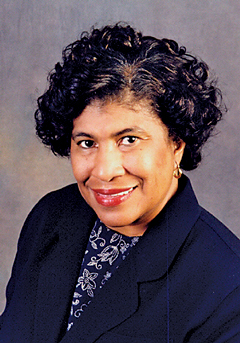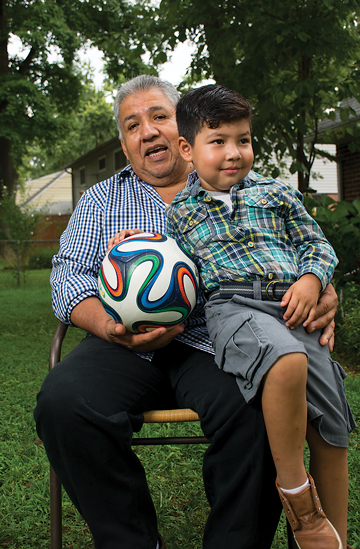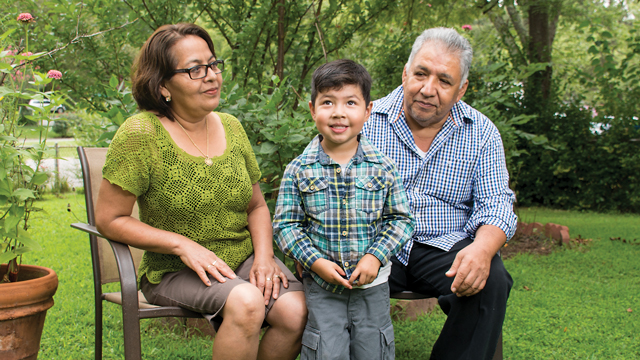Growing up in Henrico’s near West End, Carla Navarrete had plenty of family around her: her parents, an older sister, and three younger brothers. But she didn’t have her grandparents, all of whom lived in her parents’ native country of Mexico.
“We didn’t get to see our grandparents often,” she says. “Maybe once a year, and some years we didn’t get to go.”
As a result, three years ago when Carla had her first child, son Dylan, she had a specific goal in mind: making sure her son got to spend time with his grandparents, Carlos and Reyes Navarrete, in ways that she couldn’t.
“Intentionally, I wanted them to be part of my son’s life, because I grew up without my grandparents,” she says.
Now the mother of two sons – Alexander was born in July – Carla says she is delighted that her parents are so active in helping her with parenting tasks. She credits her mother with making sure Dylan makes it to church every Sunday, and says her dad is playful and more willing to bend the rules with her kids than he ever was when she was young.
“They are tremendously helpful – especially through this pregnancy,” she says. “Dylan is so active as a 3-year-old, and they were always calling and asking if I needed them to pick him up. I really don’t think I could have gone through this pregnancy without their help.”
 Making Connections
Making Connections
Depictions of grandparents in popular culture range from the sweet – Grandpa Joe takes Charlie on the adventure of a lifetime in Willy Wonka and the Chocolate Factory – to the semi-sour – the Dowager Countess Grantham of Downton Abbey keeps both grandchildren and great-grandchildren in line with an arched eyebrow.
In real life, grandparents’ interactions with their grandchildren can have the same range of experience, but in some very lucky families, grandparents are able to participate in the lives of their adult children and grandchildren in ways that make everyone’s lives better.
If it is Carla’s aim to enrich her sons’ lives by having them spend time with their grandparents, it’s Carlos and Reyes Navarrete’s goal to help their daughter and build family bonds, Carlos says.
“It’s our family,” he says. “We want to be involved in our daughter’s life and in all of the kids’ lives. We want to help as much as we can.”
As a regular at his grandparents’ house from a young age, Dylan and his abuela often visit the play space in a nearby mall and take neighborhood walks. “He didn’t really like the stroller when he was a baby, and now he has to walk,” Reyes says. With his abuelo, it’s all about sports. “Sometimes, I’m tired, but he takes me outside,” Carlos says, laughing. “He always wants to play basketball or soccer.”
In spending so much time with Dylan, the Navarretes are experiencing parenting anew, they say. “It’s different now,” Reyes says. “We let Carla make the decisions.” Carlos adds: “We want to help, but we don’t want to interfere.”
Carla agrees that her parents walk a fine line between providing the extras that grandparents can, and keeping her guidelines in mind.
“They’re so over the top with him, they spoil him!” she says. “But they both really respect the ways I want to discipline him and teach him. I do have their support.”
Carlos Navarrete observes that because his own children are older, he and Reyes can enjoy their grandchildren in a fresh way. “Now that we have more time, we can spend that time with him,” he says. “We are always there for him.”
Benefits Go Both Ways

When grandparents are actively involved in the lives of their grandchildren, everyone benefits, according to Thelma Watson, PhD, executive director of Senior Connections/Capitol Area Agency on Aging. “It’s a win-win,” she says. “There’s a great amount of sharing and support for everybody.”
Watson says there is a definite trend in more families consciously including grandparents in their day-to-day lives. “Families are seeing the benefits of having older relatives involved,” she says, noting that grandparents can share family traditions, fill in childcare gaps during school holidays, and show little ones different problem-solving solutions.
When grandparents spend a lot of time with their grandchildren, Watson says, they benefit, too, through exposure to new technologies, increased physical activity, and the mental calisthenics involved in keeping up with youngsters making sense of the world around them.
“We all know that activity and engagement help keep us healthy,” she says. In fact, the desire to be healthy for their grandchildren can also motivate seniors to make changes in their lives. Watson says that one grandparent told her he wanted to improve the management of his arthritis so he could attend his grandchild’s graduation.

Having grandparents involved strengthens families and individuals, says Mark Loewen, LPC, of LaunchPad Counseling. “There can be a strong bonding that occurs that expands kids’ abilities to form attachments,” he says. “A healthy family in general will help kids see the world in a positive light; they will assume the world is full of good people.”
Loewen agrees with the Navarretes’ observation that they have more time to spend with their grandchildren than they did when they were raising their own kids. “Grandparents will do things that a parent can’t always do,” he says. “They can dedicate time that a parent can’t.”
In spending time with grandchildren, grandparents are teaching all manner of lessons, Loewen says, noting that adult clients have told him that they learned to parent from their grandparents. Plus, there’s a different, but significant connection between grands and kids: “It’s the enriched experience of being with someone who loves you and thinks he world of you, but from a different perspective than your parents,” he says.
Under One Roof
Richmond grandparents Lelia and Bob are delighted that their adult son, Jason, and his two children – a school-age daughter and preschool-age son – moved in with them in early 2016 following a divorce. While the circumstances leading to the new living situation weren’t ideal, the outcome has been a joy, Lelia says.
“There was no question about them coming over here,” Bob says. “I’m going to be very sad when they move out.”
Because the grandchildren divide their time evenly between their parents, Lelia and Bob say the impact of having three more people under their roof has been minimal. They still live in the house where they raised their four children, so Jason and the kids simply moved into empty bedrooms and use a separate bathroom. On the first floor, the adults took furniture from Jason’s family room and positioned it to re-create the kids’ old family room.
Plus, as Jason notes, the kids already knew their grandparents well. “My folks have been around all their grandchildren from the beginning,” he says. “With our family, everybody enjoys each other’s company.”
Bob and Lelia help by picking up their granddaughter at her school bus stop every day, and stay with the kids when additional adult coverage is needed. Jason notes that the kids’ ages mean that evenings can be hectic with sports and homework, but everyone is in bed early. Bob credits Lelia with running a tight ship. “She’s the queen of organization,” he says.
When Jason and his kids moved in, Bob and Lelia agreed that some of their basic rules would remain – like no running in the house – but that Jason ultimately holds primary authority. “We’re not going to change his rules, but they don’t mess up much,” says Bob. He adds, “Jason is incredibly easy to be around, and so are his children.”
 Working It Out
Working It Out
Loewen says it’s important for grand-parents and their adult children to establish guidelines for how parenting occurs, whether everyone is under the same roof or not. “Good communication where the [adult] parent can set healthy boundaries, and the grandparents respect those boundaries, is essential,” he says. “The grandparent doesn’t need to be another parent exactly. If roles are discussed and boundaries are clear, then children won’t be confused. And when parents have support, they’re better parents.”
Watson, from Senior Connections, agrees. “Grandparents are willing to learn what the new [parenting] techniques are and also appreciate that parents are in the driver’s seat,” she says.
While some adult children might balk at the idea that they should move back in with their parents, bringing their own children along, Loewen notes that multigenerational family living is the societal norm worldwide. “In mainstream American culture, you become a successful adult when you don’t need your parents, but other cultures don’t believe that,” he says.
Even if families aren’t living with several generations in one household, regular get-togethers are helpful in maintaining strong ties. Weekly, or even monthly, dinners help people remain familiar with one another and more tolerant of individual quirks, Loewen says. “When people get together for only short periods of time, like over holidays, it can be stressful,” he notes.
Carlos and Reyes Navarrete, who have lived in the United States for decades, say they rely on a cultural tradition that encourages regular contact without overstaying their welcome. “There’s a saying that you shouldn’t visit too often, and when you do, don’t stay too long,” Carlos says, laughing. But their family recognizes the importance of regular interaction. In fact, the Navarretes recently expanded their kitchen so they can have a bigger table – one long enough for everyone in the extended family to sit around.
Nationally, the 2000 U.S. Census reported that approximately 3.7 percent of U.S. households –3.9 million – were multigenerational families, households with at least three generations living under one roof. By 2010, the percentage had grown to 4.4 percent, or 5.1 million households nationally. A variety of factors help create multigenerational households, but most are tied to economics.
Jason says his initial goal in moving in with his parents was to take his time before making another home purchase, following the sale of the house he had shared with his ex-wife. “It’s a huge benefit that I don’t have to rush out to buy a house,” he says. Plus, he adds, his kids are loving the experience. “They’ve been around my parents from the beginning.”
Thinking about the future, Jason says, he hopes that if it were necessary, he could help out in a similar way. “It would be nice to put myself in this position for my kids,” he says.
Carla agrees that relationships between grandparents and their grandchildren are irreplaceable. “Dylan’s growing up with his grandparents, and I’m jealous,” she says. “I don’t think my parents realize how much they do to help me on a daily basis. Those small things make a huge difference in my life.”
Indeed, in everyone’s.







